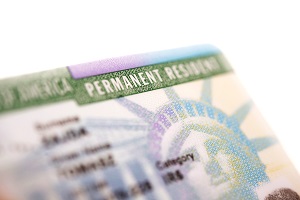10 Things You Didn’t Know About Section 245(i)
“El Show Sin Fronteras”
Section 245(i) History
Section 245(i) is a type of amnesty that everybody remembers, the amnesty law came about in the year 1986 if there are a billion people who settled at that time and have brought their family members and there are a lot of people here because of this amnesty from about 440 years ago.
Since that time, Congress has never successfully passed immigration reform as another type of full amnesty, but between the years 1997 and 2000, Congress took into effect this law, 245(i).
It was a type of amnesty, even though it turns out to be a little confusing, because it applies to certain cases, and people who were fixing at that time remember the law, but the law says that when someone files an I-130 petition, or an employee petition before April 30, 2001, it doesn’t matter how the person entered the country.
When the priority date of that petition is up even if that person entered without a visa and is not an immediate relative of a U.S. citizen, that person can arrange without leaving the United States.
An example could be a person who entered without a visa had a father who was a permanent resident and applied for it, but in this case it is a daughter, she was already over 21 years old, she was already an adult, so she will have to wait years to receive her priority date, but when the date approaches, she will be able to settle without needing a waiver, without even needing to process through the Consulate.
It’s an amnesty that says there is a way to settle within the United States without having to leave.

For all persons who were included in a petition that was sent to immigration prior to 2001, it is important to note that you do not need to use that 2001 petition to settle in the United States.
In general, 245(i) states that when someone was petitioned by an employer, by a relative or was included as a derivative, being the child of a person who was petitioned prior to April 30, 2001, they can now arrange to become a permanent resident without having to leave, without needing a waiver, without having to process through the Consulate when the priority date is ready.
How Do I Know If I Qualify For Section 245(i)?
For adult children of permanent residents and for siblings of U.S. citizens who were petitioned in 2001, they already have a priority date ready or almost have their priority date ready depending on their country of origin.
All those who were petitioned before 2000 should now investigate if it is time to move forward with their immigration process, because the 20 year waiting period has already passed, if you have doubts or believe that it is already your time, it is something that at Lincoln-Goldfinch Law – Abogados de Inmigración we can review in a consultation that is completely free, and it does not matter if you lost your papers, did not receive any notice from immigration, do not know what happened with your case, if your petitioner already passed away for example, it does not matter those things, because we can investigate and request a copy of your file with immigration, and most of the time we can move forward with these cases.
Now is the time especially for people from Mexico who were petitioned by a parent who was a citizen or permanent resident, or were petitioned by a sibling, now they are practically ready to move forward.
If you were included in a case, let’s say a U.S. citizen aunt petitioned for her sister who had entered without a Visa, and the undocumented sister had two children that she brought, that petition included the undocumented mother and the children, it doesn’t matter if they were included in the petition, that’s a case of three people who can now move forward with their cases.
It is very important to review your case, and if you do not know what happened because you do not have the documents, now is the time to start investigating your situation.
What Can I Do If I Don’t Know What’s Going On With My Immigration Case?
At Lincoln Goldfinch Law since 2007 we have worked with immigrants who came to our office to receive a consultation securing situations such as: I think my uncle made a request for my mother, or I think my father asked me but now I have no contact with him, or I think I had something pending in the year 2000 but I do not have the information, for all those people, what we do is that we order the copy of their file with immigration, and that file has the name of FOIA.
FOIA is a request that we send to the immigration agency so that we can request any document or any request that is related to that person.
If that person requested someone different, if that person was requested by someone, that is information that we can get with immigration and then have the document, the approval, the receipt, and use that document to be able to actually arrange based on Section 245(i).
What To Expect From A 245(i) Case?
This type of case is often done to find this type of evidence for people who are applying for immigration status.
Sometimes in this law we are not using the petition to fix or let’s say in this case the example that if a woman who was a citizen of the United States, petitioned for her sister who had entered the country with her two children, all without documents, this sister now has her priority date, if she is from Mexico her priority date is going to be ready in a year, so now would be a good time for the sister who is a mother, to start her process to fix to permanent resident without needing a waiver, without having to leave.
The nephews and nieces that were included in this process are now over 21 years of age, and that is why they can no longer be included as derivatives, because when someone turns 21 years of age they cannot be arranged as a derivative in a family petition.

Si Tienes 20 Años En Los Estados Unidos Y Habías Comenzado Tu Proceso Migratorio Puedes Consultar El Avance Del Mismo
La buena noticia es que ellos siguen siendo elegibles bajo la sección 245(i) para hacer un ajuste de estatus, si pueden contar con otro familiar o por ejemplo un esposo o esposa.
Digamos que el sobrino entró sin Visa en aquel entonces y ahora está casado con una ciudadana americana, los pasos que debería seguir una persona por haber entrado a los Estados Unidos sin Visa, sería efectuar el proceso consular con un perdón, la I-130 , la salida y la entrada al país.
Esa persona no cuenta con un permiso de trabajo porque estaba incluido en la petición de la tía ciudadana hace 22 años, de igual forma esta persona está incluida en el programa 245(i), por lo que puede realizar su ajuste de estatus sin un perdón, sin tener que salir de los Estados Unidos siquiera, porque él estaba registrado en la ley 245(i).
A veces hacemos uso de la petición familiar que fue hecha hace años para arreglar en los Estados Unidos porque la fecha de prueba está lista, pero también a veces utilizamos la inclusión de una persona en una petición aunque no estemos arreglando por petición familiar, porque esa persona está incluida en la amnistía de la 245(i).
¿Si Una Petición Se Tarda Mucho Puedo Calificar Para 245(i)?
Un aspecto interesante de esta ley, es que la petición que haya sido enviada antes del 30 de Abril de 2001 no tiene que haber sido necesariamente aprobada, usted solo tiene que ser elegible, entonces si todos los requisitos se cumplieron, si era una relación real y el peticionario de hecho tenía el estatus legal con la residencia permanente o ciudadanía y algo pasó con el caso, digamos que inmigración mandó una noticia pidiendo más evidencia y nadie respondió, por lo que usted nunca fue aprobado, no importa, porque todavía podemos usar la solicitud que fue recibida en inmigración antes del 30 de Abril de 2001, para poder ser incluido en el programa 245(i).
Cabe acotar la importancia de que aunque usted no disponga de la noticia de aprobación en su casa, aún así vale la pena investigar y pedir la copia de su expediente con inmigración, porque aparecen muchas pruebas de elegibilidad para este programa, y el no hacerlo puede tener como consecuencia que usted gaste mucho tiempo, mucho dinero, incluso un viaje para presentarse en el Consulado.
Nosotros realizamos la estrategia en los casos del proceso consular para muchos clientes, y somos exitosos en ello, pero es un proceso muy estresante y delicado para ellos porque tienen que salir del país para obtener la respuesta final de su caso, pero con la ley 245(i), no es necesario salir de los Estados Unidos, es un programa en donde usted puede realizar todo el proceso aquí dentro de los Estados Unidos, y es por eso que vale la pena comenzar este proceso si califica.
¿Puedo Aplicar A La 245(i) Si Mi Petición Familiar Fue Negada?
Eso es algo que hay que revisar en una consulta privada ya que cada caso es diferente, la razón de esa decisión negativa, de hecho es raro tener una decisión negativa en una I-130 que esté bien hecha.
Normalmente es cuando falta una respuesta de una persona, y esa es la forma en la que inmigración pide más evidencia, en este caso hay que revisar el expediente completo de inmigración y la razón por la que tomaron la decisión negativa, ya dependiendo de lo que pasó, tenemos maneras de revertir esto.
Si por ejemplo una madre que es residente permanente pidió a su hija en el año 2000 y su hija tenía 20 años de edad y ahora tiene 21 años de edad, la madre puede pedirla otra vez y usar la misma fecha de prioridad.
Todos los casos y todas las complicaciones en ese tipo de programa de 245(i), como cambiar los peticionarios o beneficiarios, al cumplir los 21 años y cambiando la fecha de prioridad, todo eso puede resultar muy complicado para las personas, pero deben recordar que si alguien en su familia incluyéndose a usted, fueron pedidos antes de la fecha 30 de Abril 2001, ahora es el momento de investigar si puede usar esa petición para arreglar en los Estados Unidos.
Si fue una petición directa la que realizó su familia, ya es el momento en donde estas fechas de prioridad están casi listas para los hijos y hermanos de residentes permanentes y ciudadanos americanos, ahora es la oportunidad para comenzar su caso, y no importa si no cuenta con los documentos o no recuerda los detalles, ya que estas son cosas que nosotros podemos averiguar.
Hacemos hincapié en que este es el momento para empezar con su proceso, porque va a demorar meses en obtener el expediente de inmigración, y debe actuar lo más pronto que sea posible, para que así cuando su fecha de proceder llegue, usted pueda enviar su solicitud e inmediatamente.
¿Qué Pasa Si No Sé Si Califico?
Inmigración nunca toma la responsabilidad de ayudar a personas inmigrantes en el proceso migratorio y es una lástima, pero hay muchísimas personas que no investigan o no reciben consejos positivos, puede que también estén trabajando con un notario o están tomando el mal consejo de un hermano o de un vecino.

Obtén Tus Papeles Consultando Con Lincoln Goldfinch Law Acerca De Tu Tiempo De Estadía En USA
They do not have the necessary information for their situation, but they still make their case on their own and do not know that there is a way to do it without having to leave the United States, or that there may also be risks or consequences in their consular process, so they should not leave the country.
It is the responsibility of each person who is immigrating to find and consult with a reputable immigration attorney who has a lot of experience in their type of case, because these cases can become very complicated, and it is worth considering a strategy for your specific case, to make sure that everything is perfect from the beginning.
Because in the United States today, the immigrant community does not have an immigration agency that cares enough to assist them in their immigration process, it is the responsibility of each individual or immigrant family that is currently deciding to begin their immigration process to find and make use of the advice of an experienced immigration attorney.
Is There A Deadline?
If the case is with the National Visa Center, they will terminate and close the case if the circumstance occurs where they do not have communication with the petitioner after their priority date has arrived, but normally in that program, they are talking about an opportunity to move forward in the United States with their permanent residency.
In case you have additional questions about 245(i), your relative’s petition, or your specific case, you can contact us at (855) 502-0555. After a short 10-minute evaluation of your case via telephone we will let you know what options you have. You can also follow us on our social networks so you don’t miss our weekly broadcasts via Facebook, YouTube & Twitch.
Frequently Asked Questions About Section 245(i)
Contact A U.S. Immigration Attorney Today!
Categories
How To Find Us
What Our Clients Say
“This Lawfirm is great, very professional and helpful. I love that they are always in communication and always available for when you have questions . 100% recommended by me and my family. Thank you Lincoln-Goldfinch Law – Abogados de Inmigración”





